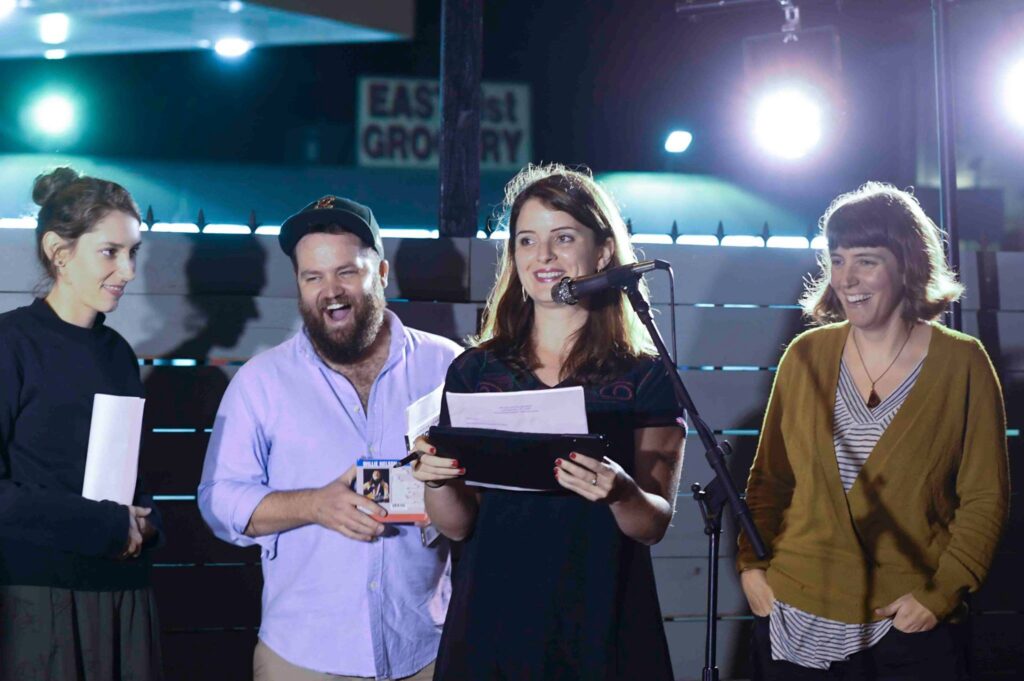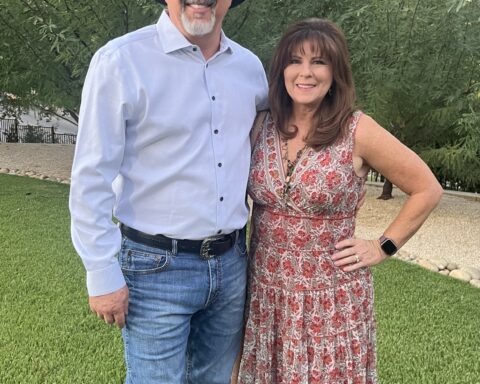Adeena Reitberger
One thing I love about our town – it contains so many underpublicized miracles. My current case in point is American Short Fiction, which was founded in 1991 by Laura Furman at the University of Texas and is now an independent entity. Adeena Reitberger, her co-editor Rebecca Markovits, and the rest of their staff oversee this preeminent literary journal. It is ranked among the top ten worldwide and has approximately 4000 subscribers, who receive three issues annually. (The postage cost to send copies to Japan, Germany, and other far-flung destinations is a significant expense, but they like to imagine the stories being read in different corners of the globe.) On a recent afternoon, I sat down with Adeena and enjoyed a conversation about her life, particularly the 13 years she has been with American Short Fiction.
When she was growing up in Baltimore, writing was her primary interest. In high school, she was a member of the literary magazine staff, took creative writing classes at the Bethesda Writing Center, and spent time immersed in literature. After she finished her master’s in creative writing at Western Michigan in 2008, she journeyed to Austin because a friend had extolled our town’s virtues to her. And like many people, she stayed. “I was such a sheltered East Coast kid,” Adeena says. “I knew almost nothing about Austin. But I immediately made wonderful friends, and the literary community was electric and inviting.”
Adeena started volunteering at ASF soon after she moved here, while supporting herself by teaching English at Manor High School, where she launched a literary magazine. Before long, she transitioned to teaching creative writing at Austin Community College. In 2011, the ownership at ASF started having serious discussions about relocating the publication’s headquarters to New York City or elsewhere, but the board prevailed and kept it in place. Soon after, Adeena and Rebecca were named co-editors of the publication.
That decision proved to be excellent, and ASF has maintained its solid presence in the literary field. In 2023, LitHub listed the Top Nine Literary Journals, stating, “In order: The New Yorker, Ploughshares, Granta, Zoetrope, The Paris Review, The Southern Review, ZYZZYVA Magazine, American Short Fiction, and McSweeney’s. These are all successful American literary journals with high-profile contributors and outstanding reputations."
Adeena notes that one thing that sets ASF apart is its commitment to thorough editing of the published stories. Rather than publishing stories as they have been submitted, as many literary magazines do, ASF works closely with writers to refine and strengthen their pieces, providing an editorial rigor that honors the writer’s vision and elevates the final work. The writers aren’t asked to accept every edit, but they are open and appreciative of the process. She says that even the established stars in the writing world are glad to engage in back-and-forth discussions, which helps deepen the magazine’s relationships with its contributors.
Some of the writers whose works have been published in ASF include Joyce Carol Oates, Joy Williams, Dave Eggers, Dagoberto Gilb, Manuel Muñoz, Roxane Gay, and Kevin Wilson. It’s a testament to the ongoing efforts of their editorial team that the magazine has premier contacts in the literary world and continues to bring in fresh work from top-tier authors. One way the publication maintains its high profile is by awarding its annual Halifax Ranch Fiction Prize, which recognizes fiction under 6,500 words. The prize includes $2,500, a stay at the Tasajillo Residency in Kyle, and publication. Their work has paid off -- in 2019, the magazine was recognized with the Whiting Literary Magazine Prize, one of the most prestigious awards in the literary field. In 2024, ASF was a finalist for the National Magazine Award for Fiction.
Speaking of what can happen when a writer gains exposure in ASF, Adeena points to the story of Alejandro Puyana, whose novel, "Freedom Is a Feast," was published in 2024. In 2018, he submitted a story about street children in Caracas to ASF’s annual contest. ZZ Packer selected it as a winner, and it ran in Issue 68. After that exposure, his story was chosen by Curtis Sittenfeld for Best American Short Stories 2020. Then he was admitted to the Michener Center for Writers. Adeena says, “Alejandro’s work is incredibly deserving of all the accolades, but I think it’s fair to say exposure in ASF helped move his career forward more quickly.”
Another writer ASF had the pleasure of publishing early in her career is Carrie R. Moore, an Austin-based author whose story collection, “Make Your Way Home,” was published this July. Moore was honored at ASF’s Stars at Night gala this year, and her story “When We Go, We Go Downstream” opens this summer’s issue with a bang. “It’s really special to be in on the first part of someone’s career,” Adeena says.
ASF has also launched a public reading series, called Stories Sessions. Last year, they brought in Percival Everett, who won the National Book Award for his novel “James” a month later, and hosted the event in the Huston-Tillotson University’s King-Seabrook Chapel. Adeena says that Everett told a fantastic story for about 40 minutes. “Everyone was on the edge of their seats the whole time.” This year, they are bringing Susan Choi, who won the National Book Award for “Trust Exercise” a couple of years ago, and has written a novel called “Flashlight” that was recently longlisted for the Booker Prize. The free event took place on Friday, September 12.
Another ASF program that deserves note is The Insider Prize, which awards non-fiction and fiction prizes to writers incarcerated in the Texas Prison system. I’ve read one of the stories, and it was, to say the least, intense and well-crafted.
Every year, ASF’s Stars at Night gala honors a community star. This year, it was Leila Green Little, the lead plaintiff in Little vs. Llano County, who is fighting the state of Texas in a lawsuit about censoring books—a lonely battle in a small town. She was featured in “The Librarians,” a movie that premiered at the 2025 Sundance Film Festival. According to Adeena, her story was one of the most moving parts of the program that night, which also featured superstar writer Joy Williams and Carrie R. Moore, among others.
In 2023, Adeena and the rest of ASF’s team launched “MFA For All,” a virtual educational program that aims to make MFA-level instruction more accessible. Hundreds of people nationwide signed up for the first semester. They provide graduate-quality lectures by writers who are hard to access. For example, Kevin Wilson, Elizabeth McCracken, and Tommy Orange (who recently won the National Book Award) will be teaching this fall semester. ZZ Packer, Lauren Groff, and Karen Russell have also taught in past semesters. ASF intentionally keeps prices below market rates to encourage broader participation.
With her intelligence, charm, and communication skills, Adeena could have had a terrific career in corporate America. But she’s gone down this path of helping the rest of us experience exciting new fiction and promoting the careers of upcoming literary talents, and she’s happy with her choice. “Literature teaches us to see beyond ourselves, to recognize the worth and wonder in lives that, on the surface, may seem unlike our own. It cultivates the empathy and courage we need to live wisely and care deeply.”
Keeping the magazine alive
by Melanie Moore
In 2002, I left high-tech to return to writing—my passion and the focus of my graduate degree. Recruited here by a software company in 1999, I didn’t know the Austin literary community. I read about then-defunct American Short Fiction (ASF). To learn more, Mary Margaret Farabee and others connected me with founding editor Laura Furman, editor Joe Kruppa, and Michener Center director Jim Magnuson. With that history, I approached the UT Press with a proposal to revive ASF. They said no, but offered to sell it. I bought it and founded Badgerdog Literary Publishing in 2003—a quixotic attempt to support writers of all ages and create jobs. After starting Austin’s first writers-in-the-schools program in 2003, we relaunched ASF at the 2006 AWP Conference. Badgerdog is now part of the Austin Public Library, and ASF is thriving—in continuous publication longer than the original run before I bought it.







